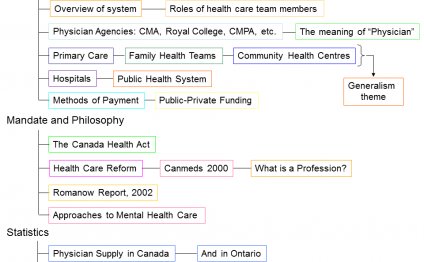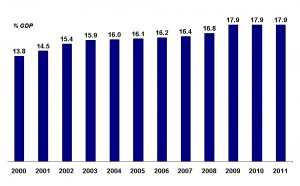
Canadian Health Care System
Health care systems differ, and there can be many myths about their pros and cons. — Photo by RK Studio/Kevin Lanthier/Getty Images
En español| How does the U.S. health care system stack up against Canada’s? You’ve probably heard allegedly true horror stories about the Canadian system — like 340-day waits for knee replacement surgery, for example.
To separate fact from fiction, Aaron E. Carroll, M.D., the director of the Center for Health Policy and Professionalism Research in Indianapolis, identified the top myths about the two health care systems.
Myth #1: Canadians are flocking to the United States to get medical care.
How many times have you heard that Canadians, frustrated by long wait times and rationing where they live, come to the United States for medical care?
I don’t deny that some well-off people might come to the United States for medical care. If I needed a heart or lung transplant, there’s no place I’d rather have it done. But for the vast, vast majority of people, that’s not happening.
The most comprehensive study I’ve seen on this topic — it employed three different methodologies, all with solid rationales behind them — was published in the peer-reviewed journal Health Affairs.
The authors of the study started by surveying 136 ambulatory care facilities near the U.S.-Canada border in Michigan, New York and Washington. It makes sense that Canadians crossing the border for care would favor places close by, right? It turns out, however, that about 80 percent of such facilities saw, on average, fewer than one Canadian per month; about 40 percent had seen none in the preceding year.
Then, the researchers looked at how many Canadians were discharged over a five-year period from acute-care hospitals in the same three states. They found that more than 80 percent of these hospital visits were for emergency or urgent care (that is, tourists who had to go to the emergency room). Only about 20 percent of the visits were for elective procedures or care.
Next, the authors of the study surveyed America’s 20 “best” hospitals — as identified by U.S. News & World Report — on the assumption that if Canadians were going to travel for health care, they would be more likely to go to the best-known and highest-quality facilities. Only one of the 11 hospitals that responded saw more than 60 Canadians in a year. And, again, that included both emergencies and elective care.
Finally, the study’s authors examined data from the 18, 000 Canadians who participated in the National Population Health Survey. In the previous year, 90 of those 18, 000 Canadians had received care in the United States; only 20 of them, however, reported going to the United States expressively for the purpose of obtaining care.
Myth #2: Doctors in Canada are flocking to the United States to practice.
Every time I talk about health care policy with physicians, one inevitably tells me of the doctor he or she knows who ran away from Canada to practice in the United States. Evidently, there’s a general perception that practicing medicine in the United States is much more satisfying than in Canada.
The Canadian Institute for Health Information has been tracking doctors’ destinations since 1992. Since then, 60 percent to 70 percent of the physicians who emigrate have headed south of the border. In the mid-1990s, the number of Canadian doctors leaving for the United States spiked at about 400 to 500 a year. But in recent years this number has declined, with only 169 physicians leaving for the States in 2003, 138 in 2004 and 122 both in 2005 and 2006. These numbers represent less than 0.5 percent of all doctors working in Canada.
So when emigration “spiked, ” 400 to 500 doctors were leaving Canada for the United States. There are more than 800, 000 physicians in the United States right now, so I’m skeptical that every doctor knows one of those émigrés.
In 2004, net emigration became net immigration. Let me say that again. More doctors were moving into Canada than were moving out.
Myth #3: Canada rations health care; that’s why hip replacements and cataract surgeries happen faster in the United States.
When people want to demonize Canada’s health care system — and other single-payer systems, for that matter — they always end up going after rationing, and often hip replacements in particular.
Share this Post
Related posts
United Regional Health Care System
Just before entering the work search, you need to review and take these United Regional Pledge of Excellence. When you review…
Read MoreUS Health Care System Explained
This brief movie is an essential guide for just about any international students seeking to study or visit america. With…
Read More
















